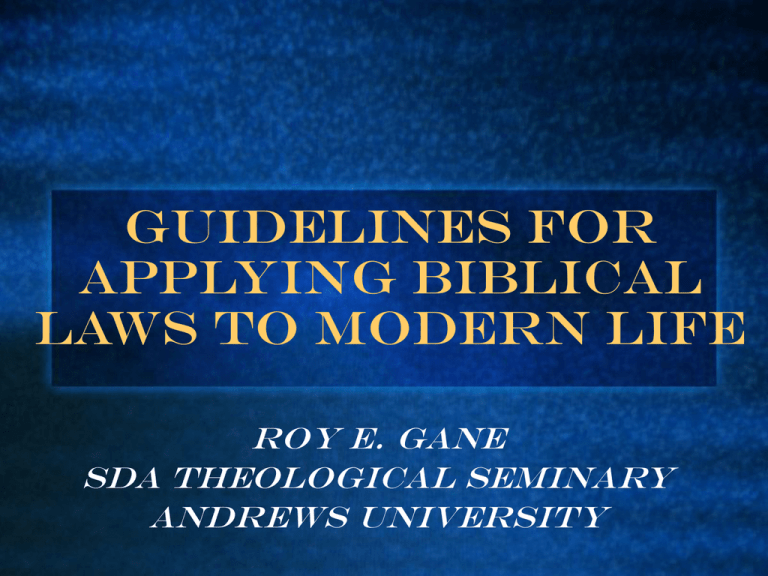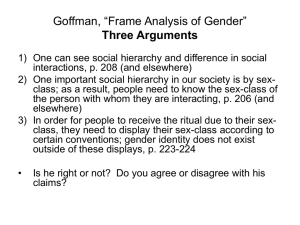
Guidelines for
Applying Biblical
Laws to Modern Life
Roy E. Gane
SDA Theological Seminary
Andrews University
Roy E. Gane
Westpoint Presentations
1.
2.
3.
4.
5.
The Purpose Of God’s Law And Obedience
To It
Law, Legalism, and “Righteousness by
Faith”
GUIDELINES FOR APPLYING
BIBLICAL LAWS TO MODERN LIFE
How to Identify and Apply Timeless
Principles in Biblical Laws
Application of Biblical Laws Regarding
Divorce and Homosexual Practice
Traditional Categories of Law
Moral
Ten
Commandments
Timeless, universal principles governing
relationships
Ritual/Ceremonial
Ritual
“types”/“shadows” until fulfillment at
the cross
Traditional Categories of Law
Civil
Apply
only under Israelite theocracy
Health
Ongoing
the same
because human bodies function
Traditional Categories of Law
No sharp distinction between sacred and
secular
“Religious” laws of Exodus 22:20, 28a30; 23:10-19a in contexts primarily
relating to “secular” life
Mixture of laws in Leviticus 19: keep all
God’s commandments
Wholistic approach to life under God
Moral Laws
Any command God gives is relevant to the
divine-human relationship
The Ten Commandments are great examples
of moral law
There are other moral laws in the Bible
Exodus 23:9—“Do not oppress an
alien…”
Leviticus 19:11—“You shall not . . . lie to
one another”
Ritual Laws
Regulated ritual system at sanctuary/temple
Through rituals, people interacted with
entities ordinarily inaccessible to the material
domain (God, sin, impurity)
Ritual laws (including regarding festivals) no
longer apply because sanctuary/temple
institution is gone
Circumcision no longer applies under the
universal “new covenant” (Acts 15)
Ritual Laws
Not all ritual laws were fulfilled at the cross:
Autumn festivals remained
But Christ moved the focus of worship to the
heavenly temple (Heb 7-10)
But ritual laws continue to teach us:
Nature and character of God and mankind
Dynamics of divine-human interaction
God’s plan of salvation through Christ
Ritual Laws
Indicators that a law is ritual and temporary
Dependent on the sanctuary/temple
infrastructure and not existing earlier
Provides a ritual remedy for violation
Its application is removed by the New
Testament (Acts 15)
Civil Laws
Exemplifies timeless moral/ethical principles
within the ancient Israelite context
Exod 21:12—“Anyone who strikes a man
and kills him shall surely be put to death”
This contextualizes the sixth of the Ten
Commandments: Exod 20:13—“You shall
not murder”
Civil Laws
Temporary aspects of civil laws:
Penalties administered under the ancient
Israelite judicial system, which no longer
exists
Regulation of institutions that no longer
exist (debt servitude; ancestral land tenure)
Cultural conditioning, affecting specificity
of modern applicability to varying degrees
Civil Laws
Exod 21:33-34—“If a man uncovers a pit or
digs one and fails to cover it and an ox or a
donkey falls into it, the owner of the pit must
pay for the loss; he must pay its owner, and the
dead animal will be his.”
This could literally apply today, but most of us
do not have oxen or donkeys
The underlying principle applies: We are liable
for damage to property of others resulting from
our neglect
Health Laws
Reference
Law
Deut 23:12-14 Disposal of excrement
Reason
Num 5:2-3
Impure persons put outside
camp
Avoid
indecency
Ritual purity of
camp
Lev 13-14
Impure scaly-skin disease
Ritual impurity
Num 19
Corpse contamination
Ritual impurity
Lev 12, 15
Impure genital fluxes
Ritual impurity
Health Laws
Reference
Law
Lev 20:18
No sex during menstruation
Lev 11
Impure animal carcasses
Lev 17:10-12
No eating meat with blood
Lev 3:16-17
No eating suet/fat
Lev 7:17-18
No eating sacrificial meat on
3rd day
Clean and unclean meat
Lev 11
Reason
Flow of
blood
Ritual
impurity
Life in blood
Belongs to
God
Abomination
Holy people
Health Laws
Reasons for specific observances are not
health reasons
Modern science provides health reasons
God provides for wholistic health through
keeping all His laws (Exod 15:26; Deut
7:12-15)
Laws in Multiple Categories
Sabbath laws fit under all four categories,
two of which still apply (moral, health)
Unlike the festivals, Sabbath rest preceded
the need for ritual types and does not depend
on an earthly sanctuary/temple
The “new covenant” preserved Sabbath rest,
reaffirmed by Jesus’ own example
Laws in Multiple Categories
Prohibition of sexual relations with a
menstruating woman (Lev 18:19; 20:18)
Here and Ezek 18:6 with moral laws
Lev 15:24 has ritual remedy for
inadvertence
Fits under moral and ritual law
Laws in Multiple Categories
Prohibition of eating meat without draining
blood at slaughter from respect for life (Lev
3:17; 7:26-27; 17:10-14)
Basically moral, but also ritual and health
Gen 9:4—Permission to eat blood
withheld for Noah and related to murder
Ezek 33:25-26—Violation listed with
moral faults
Acts 15:20, 29—Prohibited for Gentile
Christians
Criterion for Application
A law should be kept to the extent that its
principle can be applied unless the New
Testament removes the reason for its
application
“the principles underlying the OT are valid
and authoritative for the Christian, but the
particular applications found in the OT may
not be”—Gordon Wenham, The Book of
Leviticus (New International Commentary
on the Old Testament; Grand Rapids:
Eerdmans, 1979), p. 35.
For More on This Topic
Roy Gane, Leviticus, Numbers. NIV Application
Commentary. Grand Rapids: Zondervan, 2004,
especially pp. 305-310 on Modern Applicability
of Biblical Laws”
Roy Gane, “The Role of God’s Moral Law,
Including Sabbath, in the ‘New Covenant,’”
http://www.adventistbiblicalresearch.org/docume
nts/Gane%20Gods%20moral%20law.pdf








